It’s something many parents dread from the moment their children start speaking and then asking 1,000 questions per day: “The talk.”
Discussing the birds and the bees with your child might seem awkward. It might even seem like something best left to the stork until he’s much older. But the truth is, talking about sex with kids doesn’t have to be an all-encompassing conversation. It can actually be a very gradual process, depending on a child’s level of curiosity and age.
While there’s no magic age parents should start talking to children about sex, there are a few age-appropriate concepts to keep in mind that will make things easier for them understand. According to Parents, the conversation can begin as early as toddlerhood. Here’s an idea of what young children in certain age groups are able to understand:
- Ages 2-3: Kids can understand the correct terms for private body parts, like “vagina” and “penis.”
- Ages 3-4: Where a baby comes from, but stick to the basics. Something along the lines of, “Mommy has a uterus in her belly, which is where babies live until they are big enough to be born.”
- Ages 4-5: How a baby is born — when a baby is ready to be born, a mommy’s uterus pushes the baby out through her vagina.
- Ages 5-6: How babies are made, in a general sense. Parents can simply leave it at, “Mom and dad made you.” If your child asks for more details, you can opt for something more along the lines of, “Sperm — a tiny cell from dad — and a tiny cell inside mom called an egg joined together and started growing to make a baby.”
- Ages 6-7: The basics of intercourse, noting that the penis and vagina fit together like puzzle pieces. When they are together, sperm swim out through the penis and into a woman’s body to an egg. Parents can also make the connection between sex and relationships, noting that sex is one way people show love for one another.
(To read the rest of the age groups, read the full article here.)
[rp4wp limit=1]
Books can be another helpful learning tool for explaining the physical details and feelings surrounding sex. (Although this graphic and awkward book might not be one of them.) Fortunately, there are many age-appropriate sex education books for children that parents can use to their advantage. Littler ones might enjoy What Makes A Baby by Cory Silverberg or It’s Not The Stork! A Book About Girls, Boys, Babies, Bodies, Families And Friends by Robie Harris. Older kids, on the other hand, will likely find these titles more helpful: The Body Book For Boys by Rebecca Paley, Grace Norwich and Jonathan Mar and Deal With It: A Whole New Approach To Your Body, Brain And Life As A Gurl by Esther Drill, Rebecca Odes and Heather McDonald.
For parents who are looking to have a more comprehensive, in-depth conversation with their older children about love, sex and relationships, HealthyChildren.org provides a list of helpful tips to consider. The Mayo Clinic also provides some guidance for specific, tough-to-tackle topics pertaining to sex.
The bottom line? Every child is different and will begin asking questions about sex on his own timeline. It is ultimately a judgement call by parents as to whether their child is mature enough to handle certain information at a certain age.
Share your thoughts! Do you think there’s an ideal age to talk to kids about sex? When did you learn about the birds and the bees?
